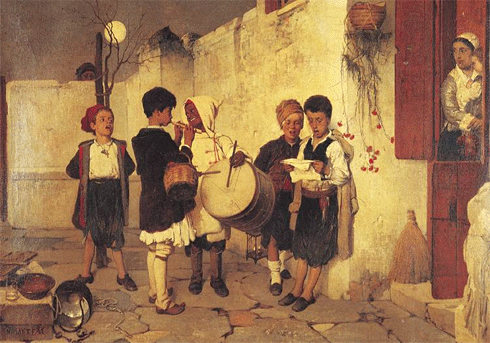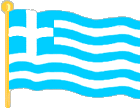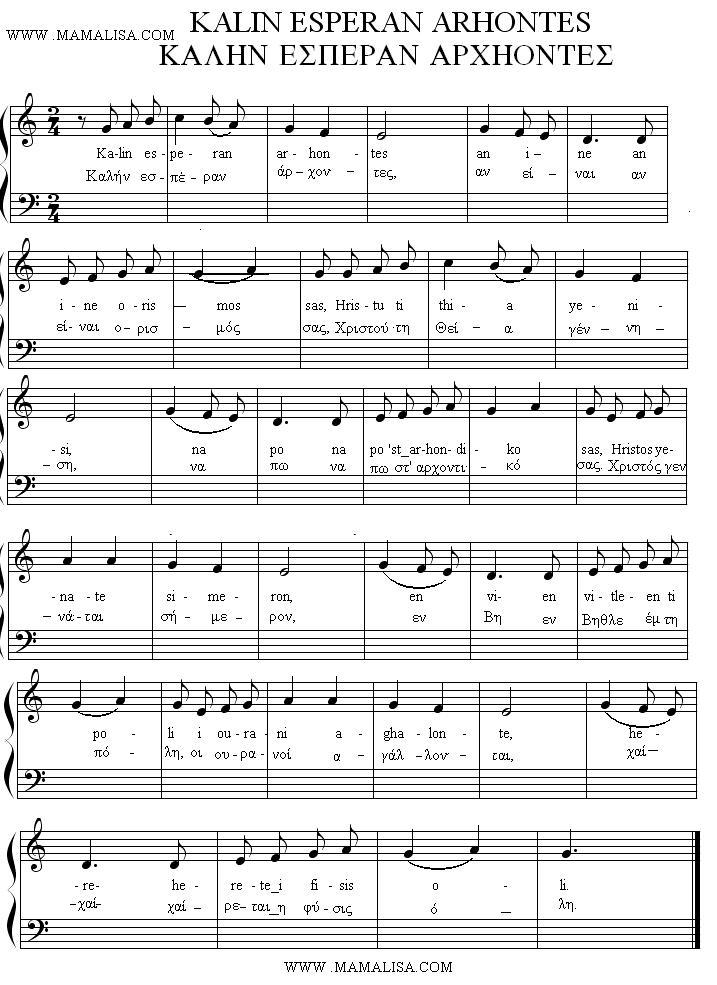Καλήν εσπέραν άρχοντες
Penelope wrote, "This last verse is sung at the end of every Greek carol to wish prosperity to the landlord."

Καλήν εσπέραν άρχοντες
Christmas Carol
Christmas Carol
Christmas Carol
(Greek)
(English)
Καλήν εσπέραν άρχοντες,
αν είναι ορισμός σας,
Χριστού τη Θεία γέννηση,
να πω στ' αρχοντικό σας.
Χριστός γεννάται σήμερον,
εν Βηθλεέμ τη πόλη,
οι ουρανοί αγάλλονται,
χαίρεται η φύσις όλη.
Εν τω σπηλαίω τίκτεται,
εν φάτνη των αλόγων,
ο βασιλεύς των ουρανών,
και ποιητής των όλων.
Πλήθος αγγέλων ψάλλουσι,
το Δόξα εν υψίστοις,
και τούτο άξιον εστί,
η των ποιμένων πίστις.
Εκ της Περσίας έρχονται
τρεις μάγοι με τα δώρα
άστρο λαμπρό τους οδηγεί
χωρίς να λείψει ώρα.
Σ' αυτό το σπίτι που 'ρθαμε,
πέτρα να μη ραγίσει
κι ο νοικοκύρης του σπιτιού
χρόνια πολλά να ζήσει.
Good evening noblemen
If this is your will,
Christ's holy birth
May I sing in your noble house
Christ is being born today
In the town of Bethlehem
Heavens rejoice
All of nature is happy.
Inside the cave (He) is being born
In a manger for horses
The King of all the universe
The Creator of everything.
A crowd of angels are singing,
"Ossana in excelsis",
And holly is
The faith of the shepherds.
From Persia three magi arrive
With their gifts
A bright star shows them the way
Without any delay.
In this house we have come
May no stone ever crack
And the landlord
May live for many years.
Notes
Here's the transliteration of the whole song:
Kalanta Xristougenon
kalin esperan arhontes
an ine orismos sas
Xristu ti thia genissi
Na po st' arhontiko sas
Xristos gennate simeron
en Vithleem ti poli
I ourani agalonte
Herete I fissis oli
en to spileo tiktete
en fatni ton alogon
o vassilefs ton ouranon
ke piitis ton olon
plithos agelon psalousi
to doksa en ipsistis
ke touton aksion esti
I ton pimenon pistis
Ek tis Pesias erxonte
tris magi me ta dora
Astro lambro tous odigi
Xoris na lipsi I ora
S'afto to spiti pou'pthame
petra na mi ragisi
ki o nikokiris tou spitiou
Xronia polla na zisi
*****
The Greek Word for Christmas Carol is Kάλαντα Χριστουγέννων and it's pronounced Kalanta Xristougenon.
Penelope wrote about the language this carol is in:
"These carols are written in 'katharevousa'. It's the older language we had before the modern one. It was introduced in the 18th century and was used in the 19th and 20th century too. In the 20th century, it was used by the state and educated people only. It was abolished from schools in 1976.
BUT the origin of carols is much older. There were children going from door to door singing and celebrating the God Dionysous in Ancient Greece. They did that holding branches of olive or bay decorated with seeds and white wool and they were given presents. The wool symbolized fertility and euphoria. This custom went on in Rome and Byzantium.
The name of the carols you asked me for is Κάλαντα Χριστουγέννων (Kalanta Xristougennwn) = Christmas Carols.
Κάλαντα (Kalanta ) = Carols
Χριστούγεννα (Xristougennα) = Christmas
Χριστουγέννων (Xristougenοn) = of Christmas (genitive)
I hope this helped you understand more. So Κάλαντα Χριστουγέννων (Kalanta Xristougennwn) = Carols of Christmas only. But there are other Kalanta (carols) too. For example in Greece we have Carols for New Year, for Epiphany, for the Saturday before Palm Sunday, and for Great Friday. But unfortunately these carols are not sung any more. Not in Athens for sure. And in small villages and towns some kids sing them but very few. I used to sing all of them when I was a child (in the 60's).
Best regards
Penelope"


Thanks!
Thanks!
Thanks and Acknowledgements
Many thanks also to Penelope Karagouni for contributing this song, translating it, transliterating it and sending the mp3 recording.
The photo above is of the oil painting called Carols (Kalanta) by Nikiforos Lytras (1832 - 1904) painted in 1872.
Ευχαριστώ πολύ!


























